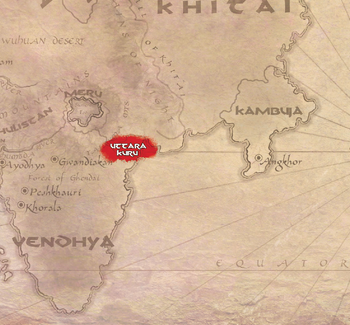

The mysterious[4] Far East kingdom of Uttara Kuru, presumed[1] to have been set between Vendhya and Kambuja,[5] with varying sizes and exact locations, depending the available maps:
- A large country (roughly a third of Vendhya's size, and on par with Kosala and Kambuja), west of Vendhya, south of the Wuhuan Desert (Hyrkania) and of Khitai and the Mountains of Night, and east of Kambuja, and bordered at south by the Southern Ocean[2]
- A relatively small country (even compared to Kosala and Kambuja), north and west of Vendhya, and south of the Mountains of Night southern area, with Khitai and Kambuja farther to the east.[6]
It was suggested that Vendhya might carve an empire out of it,[1] and the land was seen with envy by many Devi (queen of Vendhya), though it wasn't incorporated into the Vendhyan empire[5] by the Age of Conan.
Conan of Cimmeria was possibly the first, if not the sole, of his people to travel to Uttara Kuru, by 10,000 BC.[7]
History
While in Garchall, Conan the Barbarian unwillingly became one of the contestants to the Crucible, sacrificial games held in Garchall's god Challi-Mai's honor.[8] Victorious but in disgust, Conan smashed the statue of Challi-Mai.[9] Beaten, imprisoned and fated to be executed for blasphemy, Conan was freed by the ghost of Yohnic, a fellow Crucible unwilling participant. He went to the Chief Magistrate, who revealed the truth about Challi-Mai and the Crucible, and offered to become the ruler of Garchall, as he had himself no heir. Conan slew him using the Tooth of the Nightstar then set fire to the palace, before fleeing the city, expecting the people's faith to be shaken by his deeds.[10]
Conan intended to return to Khitai to deliver the sword to Maltus-Rai, as the sword was also a family heirloom that yet another participant to the Crucible, Naru-Li had swore on her honor to return,. On his way, he tried to rest at a village, but the sword started to cause him to have paranoid visions. He slew the local innkeepers, believing they were thieves, and almost turned against the unharmed villagers, seeing them as demons and cultists. Driven by the sword, Conan would slay again in Uttara Kuru and in Khitai.[7]
Facts
Language
The spoken language was "Utta".[11]
Religion
The city of Garchall worshipped Challi-Mai, the Many-Deaths, and organized a deadly conquest, the Crucible to honor him,[11] completely oblivious to the truth about Challi-Mai, a god only in myth, and of the Crucible, a way to sate the craving of the people for violence, both used by the hereditary Chief Magistrate.[10]
Geography
Uttaru Kuru was described as "filled with splendors", a "wondrous landscape" with plants unlike most of the flora typical to the western lands, yet difficult to travel, with an uneven footing, and "vexing" insects.[7]Points of Interest
- Garchall, seemingly on the coast of Uttaru Kuru[10]
Notes
- Uttara Kuru was first mentioned in The Return of Conan[1] (1957), written by Björn Nyberg and revised by L. Sprague de Camp.
See Also
- 7 appearance(s) of Uttara Kuru
- 3 mention(s) of Uttara Kuru
- 1 mention(s) in handbook(s) of Uttara Kuru
- 4 image(s) of Uttara Kuru
Links and References
References
- ↑ 1.0 1.1 1.2 1.3 Savage Sword of Conan #40 ; A Gazetteer of the Hyborian Age, Part VIII: Uttara Kuru's entry
- ↑ 2.0 2.1 Handbook of the Conan Universe #1 ; Map
- ↑ Handbook of the Conan Universe #1 ; Vendhya's profile
- ↑ Savage Sword of Conan #40 ; A Gazetteer of the Hyborian Age, Part VIII: Vendhya's entry
- ↑ 5.0 5.1 Handbook of the Conan Universe #1 ; Vendhya's entry
- ↑ Conan the Barbarian (Vol. 3) #13 ; Map
- ↑ 7.0 7.1 7.2 Conan the Barbarian (Vol. 3) #17 ; Curse of the Nightstar: part one - A Feast for the Blade
- ↑ Conan the Barbarian (Vol. 3) #13 ; Into the Crucible: part one - The People's Champion
- ↑ Conan the Barbarian (Vol. 3) #15 ; Into the Crucible: part three - Traps & Tricks
- ↑ 10.0 10.1 10.2 Conan the Barbarian (Vol. 3) #16 ; Into the Crucible: part four - Uncommon Myths
- ↑ 11.0 11.1 Conan the Barbarian (Vol. 3) #14 ; Into the Crucible: part two - The Great Crucible